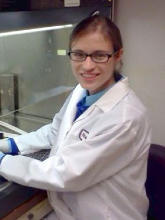Email: [email protected]
Program: Microbiology, Immunology, and Cancer Biology Graduate Student
Year Entered: 2017
Defense Year: 2024
Thesis Advisor: David Masopust (Lab website)
Dissertation Title: "Deep profiling deconstructs features associated with memory CD8 T cell tissue residence"
Research: Tissue-resident memory CD4+ and CD8+ T cells (TRM) have been identified in many tissues and organs of mice and humans. TRM reside in barrier (e.g., skin, gut, and lung) and non-barrier tissues (e.g., pancreas, kidney, liver, brain, and SLOs). TRM are the dominant T cell population involved in the immunosurveillance of most organs. Upon activation they are capable of in-situ proliferation, producing proinflammatory cytokines, recruiting circulating memory cells and B cells, as well as other functions. These abilities make TRM important players in monitoring and protecting the tissues they occupy from infection and cancer. Recently, there has been an increasing awareness that they also likely promote unfavorable responses such as inflammatory diseases, transplant rejection, allergy, and autoimmune diseases that include inflammatory bowel disease, vitiligo, and multiple sclerosis. If TRM does have a prominent role in immunopathology, the elimination of TRM in affected tissues may reduce levels of inflammation and close those tissues to routine immune surveillance, allowing for durable remission. My research project focuses on understanding how tissue-resident memory T-cell populations are generated and maintained in peripheral tissues and in developing depletion strategies explicitly targeted against tissue-resident memory T-cell populations. Depletion strategies can be tested in relevant autoimmune and allergic mouse models as well as transplant models in both clean and dirty mice, and will also help elucidate tissue-specific mechanisms of T cell recruitment, retention, and homeostasis. List of publications
Degrees received:
BS, University of Minnesota-TC, 2008
PhD, University of Minnesota-TC, 2024
Current Position: Postdoctoral Scholar (Wendy Garrett's lab.), Harvard University, Boston, MA
Contact Info
